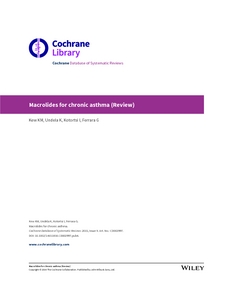Kew, KM; Undela, K; Kotortsi, I; Ferrara, G
(2015)
Macrolides for chronic asthma.
Cochrane Database Syst Rev (9).
CD002997.
ISSN 1469-493X
https://doi.org/10.1002/14651858.CD002997.pub4
SGUL Authors: Kew, Kayleigh Marie
![[img]](https://openaccess.sgul.ac.uk/107496/1.hassmallThumbnailVersion/MAC-AST.pdf)  Preview |
|
PDF
Published Version
Available under License ["licenses_description_publisher" not defined].
Download (1MB)
| Preview
|
Abstract
BACKGROUND: Asthma is a chronic disease in which inflammation of the airways causes symptomatic coughing, wheezing, and difficult breathing. The inflammation may have different underlying causes, including a reaction to infection in the lungs. Macrolides are antibiotics with antimicrobial and antiinflammatory activities that have been used long-term to control asthma symptoms. OBJECTIVES: To assess the effects of macrolides for managing chronic asthma. SEARCH METHODS: We searched the Cochrane Airways Group Specialised Register up to April 2015. We also manually searched bibliographies of previously published reviews and conference proceedings and contacted study authors. We included records published in any language in the search. SELECTION CRITERIA: Randomised controlled clinical trials involving both children and adults with chronic asthma treated with macrolides versus placebo for more than four weeks . DATA COLLECTION AND ANALYSIS: Two reviewers independently examined all records identified in the searches then reviewed the full text of all potentially relevant articles before extracting data in duplicate from all included studies. MAIN RESULTS: Twenty-three studies met the inclusion criteria, randomising a total of 1513 participants to receive macrolide or placebo. The quality of evidence was generally very low due to incomplete reporting of study methodology and clinical data, suspected publication bias, indirectness of study populations, risk of bias and imprecision (because of small numbers of patients and events). Most of the included studies reported data from patients with persistent or severe asthma, but inclusion criteria, interventions and outcomes were highly variable.Macrolides were not found to be better than placebo for the majority of clinical outcomes including exacerbations requiring hospital admission (odds ratio (OR) 0.98, 95% confidence interval (CI) 0.13 to 7.23; participants = 143; studies = 2; I(2) = 0%) or at least treatment with oral steroids (OR 0.82, 95% CI 0.43 to 1.57; participants = 290; studies = 5; I(2) = 0%). The evidence on symptom scales (standard mean difference (SMD) -0.04, 95% CI -0.36 to 0.28), asthma control (SMD -0.05, 95% CI -0.26 to 0.15), quality of life (mean difference (MD) 0.06, 95% CI -0.12 to 0.24) and rescue medication use (MD -0.26, 95% CI -0.65 to 0.12) was all of very low quality and did not show a benefit of macrolide treatment. There was some evidence that macrolides led to some improvement in lung function (forced expiratory volume in one second (FEV1): MD 0.08, 95% CI 0.02 to 0.14), although not on all the measures we assessed. Measures of bronchial hyperresponsiveness were too varied to pool, but most studies showed no clear benefit of macrolide over placebo. Two studies recruiting people taking regular oral corticosteroids suggested macrolides may have a steroid-sparing effect in this population. Macrolides were well tolerated with respect to severe adverse events, although less than half of the studies reported the outcome (OR 0.80, 95% CI 0.24 to 2.68; participants = 434; studies = 7; I(2) = 0%). Reporting of specific side effects was too patchy across studies to analyse meaningfully. As already reported in the previous versions of the systematic review, biomarkers of asthma activity, such as sputum and serum level of eosinophil cationic protein (ECP) or sputum and serum eosinophils, were lower in patients treated with macrolides, but this was not associated with clinical benefits.Two within-study subgroup analyses showed a possible benefit of macrolides for non-eosinophilic asthma, but it was not possible to investigate this further using the data available for this review. AUTHORS' CONCLUSIONS: Existing evidence does not show macrolides to be better than placebo for the majority of clinical outcomes. However, they may have a benefit on some measures of lung function, and we cannot rule out the possibility of other benefits or harms because the evidence is of very low quality due to heterogeneity among patients and interventions, imprecision and reporting biases.The review highlights the need for researchers to report clinically relevant outcomes accurately and completely using guideline definitions of exacerbations and validated scales. The possible benefit of macrolides in patients with non-eosinophilic asthma based on subgroup analyses in two of the included studies may require further investigation.
| Item Type: |
Article
|
| Additional Information: |
Copyright © 2015 The Cochrane Collaboration. Published by John Wiley & Sons, Ltd. This review is published as a Cochrane Review in the Cochrane Database of Systematic Reviews 2015, Issue 9. Cochrane Reviews are regularly updated as new evidence emerges and in response to comments and criticisms, and the Cochrane Database of Systematic Reviews should be consulted for the most recent version of the Review. Kew KM, Undela K, Kotortsi I, Ferrara G. Macrolides for chronic asthma. Cochrane Database of Systematic Reviews 2015, Issue 9. Art. No.: CD002997. DOI: 10.1002/14651858.CD002997.pub4. |
| Keywords: |
Adult, Anti-Bacterial Agents, Anti-Inflammatory Agents, Asthma, Child, Chronic Disease, Disease Progression, Humans, Macrolides, Randomized Controlled Trials as Topic, Humans, Asthma, Chronic Disease, Disease Progression, Macrolides, Anti-Inflammatory Agents, Anti-Bacterial Agents, Adult, Child, Randomized Controlled Trials as Topic, General & Internal Medicine, 11 Medical And Health Sciences |
| SGUL Research Institute / Research Centre: |
Academic Structure > Population Health Research Institute (INPH) |
| Journal or Publication Title: |
Cochrane Database Syst Rev |
| ISSN: |
1469-493X |
| Language: |
eng |
| Publisher License: |
Publisher's own licence |
| PubMed ID: |
26371536 |
| Dates: |
| Date |
Event |
| 2015-09-15 |
Published |
|
 |
Go to PubMed abstract |
| URI: |
https://openaccess.sgul.ac.uk/id/eprint/107496 |
| Publisher's version: |
https://doi.org/10.1002/14651858.CD002997.pub4 |
Statistics
Item downloaded times since 04 Jul 2017.
Actions (login required)
 |
Edit Item |



